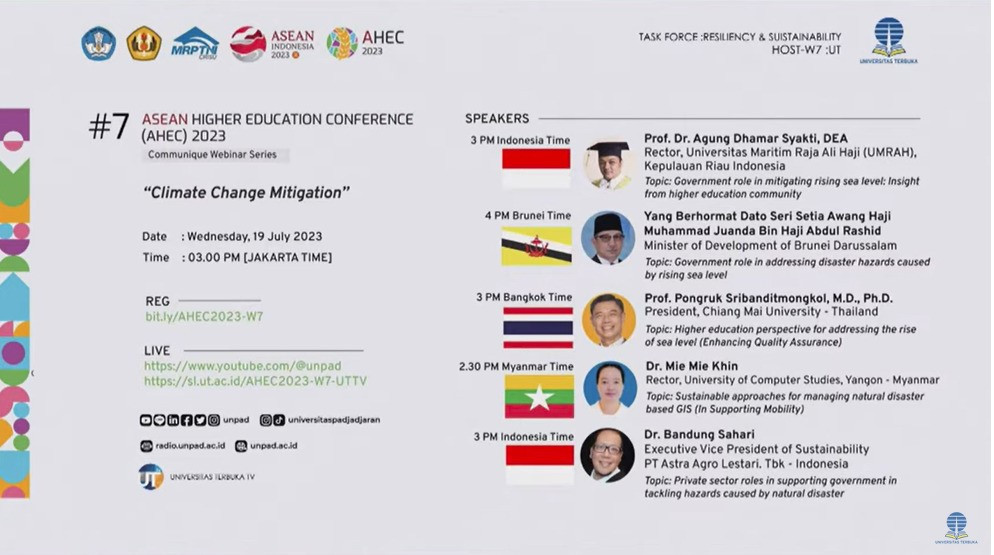Popular Reads
Top Results
Can't find what you're looking for?
View all search resultsPopular Reads
Top Results
Can't find what you're looking for?
View all search resultsUniversitas Terbuka holds webinar on disaster mitigation in Southeast Asian countries
Change text size
Gift Premium Articles
to Anyone
A
s the world shifts its attitude on climate change and global warming across the world, Southeast Asian countries have to race against the clock at a more alarming rate, largely because of its geographical characteristics.
According to the Global Climate Risk Index, compiled by environmental group Germanwatch, Vietnam, Myanmar, the Philippines and Thailand are among the 10 countries in the world that have been most affected by climate change in the past 20 years. To add to the problem, the region has had a long history in reliance to nonrenewable energy, deforestation, violent tropical weather and more.
Climate Change Mitigation is the topic of the ASEAN Higher Education Conference (AHEC) Communique Webinar Series #7, conducted by Universitas Terbuka. The focus was education on natural disaster mitigation, coastal environmental resilience, natural disaster mitigation technology and natural disaster cost management. The seventh installment of the webinar was held on Wednesday (19/07).
Universitas Terbuka convened some of the most influential academics and officials from the region who actively participate in disaster mitigations in their respective countries. The speakers were Agung Dhamar Syakti, rector of Raja Ali Haji Maritime University (UMRAH), Riau Islands, Dato Seri Setia Awang Haji Muhammad Juanda Bin Haji Abdul Rasid, development mnister of Brunei Darussalam, Pongruk Sribanditmongkol, president of Chiang Mai University in Thailand, Mie Mie Khin, rector of the University of Computer Studies Yangon (UCSY) in Myanmar and Bandung Sahari, executive vice president for Sustainability of PT Astra Agro Lestary.
“One of the fundamental actions is emphasizing education to mitigate against climate change. Of course, it is not limited to the higher education only. Education has a hugely important role to play in climate transition to a sustainable future. By increasing the quality and accessibility of education, and developing people’s knowledge, attitude and behavior toward climate change, education is a critical agent in addressing the issues, not only for the rise of the sea levels, but also climate change in general,” Agung said. He opened the event with his session, focusing on the role of government in mitigating rising sea level, as well as the pivotal role educational institutions play in shifting the outlook toward sustainability in and out of the classroom.
The stage was then given to Seri Setia Awang Haji Muhammad Juanda bin Haji Abdul Rashid. Stressing that Brunei Darussalam was a Southeast Asian state that has been plagued by flooding in recent years, he focused on the need of investment, such as in the form of coastal protection systems and drainage systems, to better prepare the people for future disasters.
“Now in Brunei, especially coupled with the heavy rainfall that we are receiving, we are [experiencing] flooding happening more frequently than expected,” he revealed. “The government has been taking action, firstly by prioritizing policy and infrastructure that will help to manage flood risk and protect vulnerable [and hard to] access communities from the impact of sea levels.”
As a case study, the minister presented the situation in Sungai Totong. The government integrated a pumping system to prevent the flow that causes flooding surrounding the river and conducted analysis from 2018 to 2021. The results show promise, successfully preventing recurrent flooding in the area. This is in addition to initiatives that have prevented coastal erosion and protection for marine ecosystem in other coastal areas as well. The government also has mandated regulations that limit development in areas that are prone to flooding.
Pongruk Sribanditmongkol, meanwhile, pointed out the complexity of the water issues in the region. While some areas in Thailand are afflicted by flooding, others are stricken by drought, which is the case with countries with a similar topography to Thailand. He also echoed Agung’s point on the importance of education in mitigating natural disasters.
“I do believe that universities or educational institutions have a unique responsibility. We must not only teach our students about the validity of climate change; we must also serve as a role model for our society in combating climate change and in mitigating its adverse effects,” he said.
Mie Mie Khin also presented on the topic of deforestation as one of the causes of disasters. Her session was titled Sustainable approaches for managing natural disaster-based GIS (in Supporting Mobility). GIS is an acronym of Geographic Information System, a computer system that analyzes geographically referenced information.
Lastly, Bandung Sahari shared about the roles of the private sector in supporting the government to tackle hazards caused by national disasters. He used the palm oil industry as a case study, focusing on peatland management, peat fire prevention and water management in the industry.
The webinar event was organized to discuss best practices to mitigate natural disasters in Southeast Asia and the role higher education plays in that regard. Moreover, it also aimed to examine the ethical issues associated with the adoption of new technologies. It is hoped that the presentations from the speakers show the various approaches and therefore serves as a platform for community building to learn from each other toward a solution.










